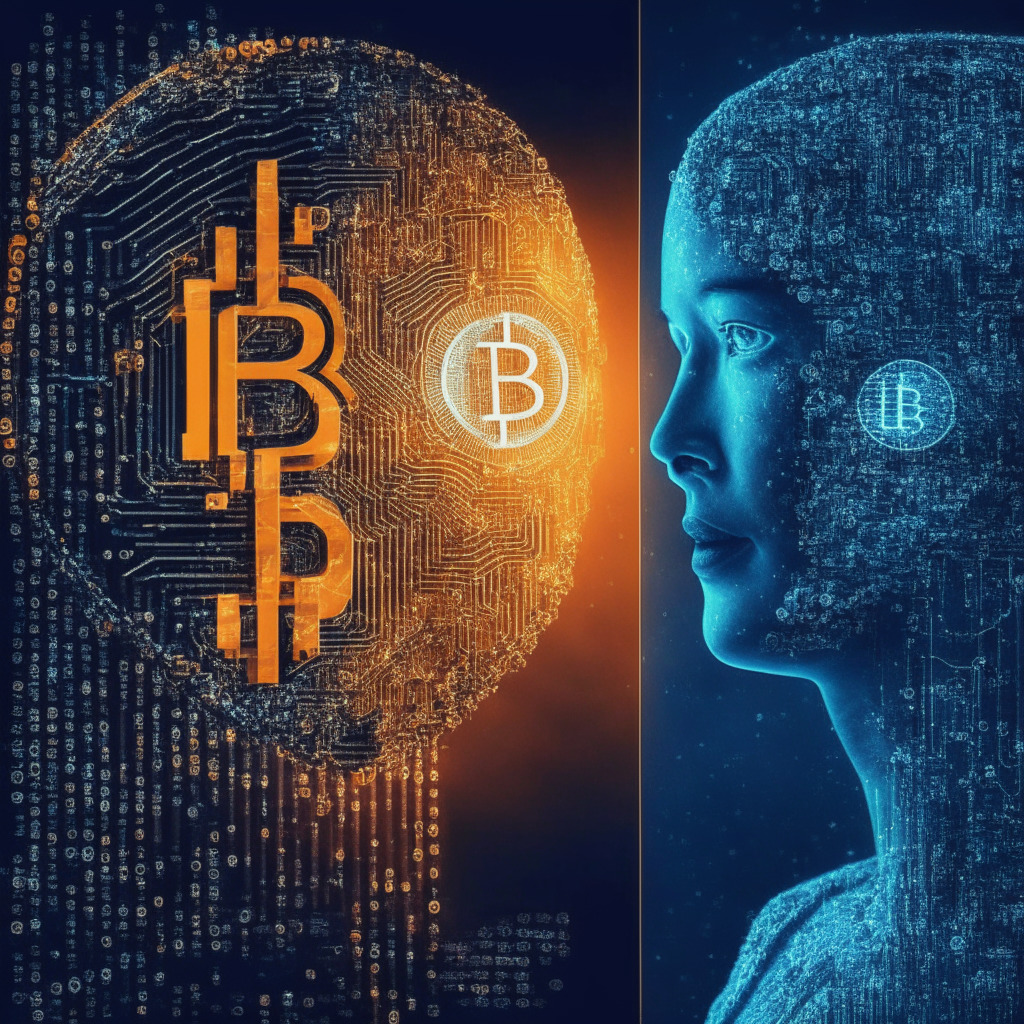This compilation of top-notch courses, including “ChatGPT Prompt Engineering for Developers” and “LangChain for LLM Application Development,” offers valuable insight for developers and enthusiasts to enhance their understanding of generative AI and stay at the forefront of this transformative technology.
Search Results for: OpenAI
AI and Blockchain: Unlocking Societal Challenges and Crypto Opportunities
AI and blockchain technology convergence offers immense opportunities for entrepreneurs to tackle societal challenges and create innovative use cases in the crypto space. Decentralized data marketplaces, token-based incentives, and computational power from decentralized networks can improve AI models and address issues like algorithmic bias and digital identity verification.
Ripple Effects of FTX Collapse: Analyzing Industry and Regulatory Impacts
FTX’s collapse led to a ripple effect on crypto companies like Silvergate Bank, BlockFi, and Genesis Global Capital, debanked crypto firms, and a regulatory crackdown. Binance considers boosting compliance, while Tether plans sustainable BTC mining in Uruguay. Nvidia, Microsoft, and other tech companies advance AI technology and NFT marketplace, Tabi raises $10 million for gaming ecosystem development.
Decentralization vs Centralization: Managing AI Extinction Risks with Crypto Principles
The crypto industry’s decentralization mindset could play a role in AI risk mitigation, addressing concerns of centralization and monopolization. A balance between national government regulation, international treaties, and decentralized governance models is needed for effective collaboration between governments and the crypto industry, ensuring AI technology develops safely.
Worldcoin vs Privacy Concerns: Can Iris-Based Crypto Secure Identities in AI-Driven Future?
Worldcoin, a cryptocurrency backed by OpenAI’s CEO Sam Altman, is powered by iris biometric features to ensure unique individuals via its “World ID” digital identity. Addressing privacy concerns, it aims to provide a secure, decentralized ID option in the AI-centric world, potentially redefining the global economy.
Elon Musk’s DOGE Lawsuit, Silvergate Bank Liquidation, and CBN’s Crypto Ban: A Tumultuous Week in Crypto
Elon Musk faces a proposed class action lawsuit by investors alleging manipulation of Dogecoin (DOGE) cryptocurrency, causing billions in losses. Meanwhile, private bank Xapo integrates with the SEPA network, and the US CFTC invites comments on risk management program changes.
Balancing AI Innovation and Privacy: Navigating International Regulation and Ethical Concerns
Japan’s Personal Information Protection Commission warns OpenAI’s ChatGPT to not collect sensitive data without explicit consent, stressing privacy concerns and potential AI benefits. International efforts are underway to regulate AI responsibly while balancing innovation and global challenges.
Japanese AI Regulation Dilemma: Balancing Privacy Concerns and Technological Innovation
Japanese regulators warn AI firm OpenAI to minimize data collection and obtain user consent, amidst growing concerns over potential risks and lack of regulations for AI technology. This follows OpenAI’s ChatGPT ban in Italy, raising uncertainties among global regulators and 69.4% of Japanese citizens calling for stricter regulations on AI development, putting the future of AI technology and regulations in limbo.
AI Popularity Soaring, Yet Bitcoin’s 2017 Hype Remains Unmatched: Analyzing Search Trends
AI has seen growing global interest, peaking at a Google Trends score of 89, yet still falling short of Bitcoin’s peak interest of 100 in December 2017. While AI dominates headlines and continues to advance, it is yet to achieve Bitcoin’s 2017 popularity levels.
AI in Blockchain Security: Potential and Limitations in Smart Contract Audits
Blockchain security company OpenZeppelin tested OpenAI’s GPT-4 model to discover smart contract vulnerabilities. Despite a reasonable success rate, the AI lacked reliable reasoning for security purposes, emphasizing the need for human auditors in assessing blockchain security.
AI vs Human Auditors in Smart Contract Security: Efficiency, Limitations, and Future Prospects
Blockchain security firm OpenZeppelin tested AI’s capacity to replace human auditors in smart contract auditing using OpenAI’s ChatGPT-4. While the AI model solved 20 of 28 Ethernaut security challenges, it’s not yet ready to replace human auditors. However, AI can improve auditor efficiency and detect vulnerabilities, indicating a potential for tailored AI models to enhance Web3 security auditing.
AI-Generated Speech in Parliament: Embracing Innovation or Risking Legislative Integrity?
Italian Senator Marco Lombardo used a GPT-4 chatbot-generated speech to spark debate on AI’s implications and potential in policy-making. As governments explore regulatory measures for AI systems, balancing AI benefits with ethical, moral, and safety concerns is crucial, urging responsible implementation and critical evaluation of its consequences.
Chatting with Satoshi: AI Bot Talk2Satoshi Sparks Insight and Confusion in Crypto Community
Pierre Corbin and Hugo Ferrer have created “Talk2Satoshi”, an AI chatbot designed to answer questions about Bitcoin and economics as if from Satoshi Nakamoto. Based on OpenAI’s ChatGPT, it demonstrates AI tools’ potential for education, encouraging healthy discussions among crypto enthusiasts despite occasional uncertainties and contradictions.
Balancing AI Regulation and Innovation: The Urgent Need for a Voluntary Code of Conduct
The EU-U.S Trade and Technology Council meeting emphasized the need for a voluntary code of conduct in AI development and implementation, as the EU AI Act is years away from being effective. Such a code could balance ethical, safety concerns and innovation, while comprehensive regulations are developed.
AI Safety vs. Progress: Striking a Balance in the Race to Advanced AI and Blockchain Integration
AI experts, including CEOs of OpenAI, Google DeepMind, and Anthropic signed a statement declaring the mitigation of extinction risks from AI as a global priority. While some perceive AI as a solution, others argue that regulation and a risk-averse approach are necessary for a harmonious coexistence between humans and AI.
Generative AI Models, Copyright Laws, and the Transformative Use Debate: Finding the Balance
Generative AI models like OpenAI’s ChatGPT raise copyright infringement concerns due to their reliance on large datasets, some potentially copyrighted. The recent U.S. Supreme Court ruling in the Andy Warhol Foundation case complicates AI companies’ fair use exemption claims. This ongoing debate impacts AI development and creators’ rights protection.
Amex’s AI Partnerships: A Future of Streamlined Finance or Controversial Practices?
American Express (Amex) plans to extend its AI capabilities through partnerships for validating transactions, approving credit lines, analyzing customer sentiment, and predicting finances, without creating its own large language model. The company aims to integrate AI into various activities and services while maintaining a cautious approach to incorporating the latest generation of AI technologies.
AI Chatbot ChatGPT Enters Crypto Forecasting: Will Wall Street Memes Token Soar?
This article discusses how ChatGPT, a generative AI technology, could potentially predict stock price movements, such as the Wall Street Memes $WSM token. Although not providing exact forecasts, ChatGPT suggests that meme coins like $WSM could experience price appreciation if they have a strong community and hype. The $WSM token aims to empower individual investors and has allocated 100% of its supply to the community. However, due caution must be exercised as the cryptocurrency market is highly speculative and volatile.
Crypto Startups Secure Millions for Web3 Gaming: Dissecting the Pros, Cons, and Future Evolution
12 crypto startups raised over $151 million this week, highlighting the growing interest in Web3 gaming. Openfort secured $3 million to develop its wallet-as-a-service product, with plans to use account abstraction for a seamless gaming experience. The surge in investments indicates a promising future for Web3 gaming, blockchain platforms, and new technologies.
Pandemic-Accelerated AI Boom: Impact on Tech Stocks and Balancing Market Optimism
Pandemic-fueled innovation in AI has catalyzed unprecedented growth in the tech industry, benefiting hardware manufacturers like NVIDIA, and software companies including Meta and Microsoft. Amid financial boons, a balance of optimism and caution is required to navigate AI’s evolving landscape and potential pitfalls.
AI Arms Race: JPMorgan Chase’s Finance Chatbot and the Ethical Debate on Unregulated AI
JPMorgan Chase filed a trademark application for finance-focused chatbot IndexGPT, aiming to use it for advertising, marketing, tracking securities values, and providing financial information. With AI playing a significant role in future trading, the company has allocated over 2,000 experts to enhance its AI capabilities. Incorporating AI-driven solutions while mitigating risks and ethical concerns will be crucial in shaping the future of finance and technology.
The Orb: Unveiling Worldcoin’s Controversial Iris Scanning Crypto Project
OpenAI CEO Sam Altman’s Worldcoin project aims to create a global ID, currency, and a crypto payment app, raising concerns and skepticism over its biometric data requirement. With The Orb as its central tool, Worldcoin recently raised $115 million in Series C round, garnering investor enthusiasm despite the concerns.
Balancing AI Innovation and Regulation: Microsoft’s 5-Point Blueprint Explored
Microsoft President Brad Smith introduces a “5-point blueprint for governing AI,” emphasizing collaboration between public and private sectors. He proposes government-required licensing for advanced AI models, acknowledging that both sectors must work together to ensure AI serves society while addressing potential risks and maintaining ethical standards.
Balancing Blockchain Future: AI Advancements, Regulations, and Risks in Focus
Microsoft President Brad Smith urges lawmakers and companies to establish regulations and risk management strategies for AI development, emphasizing the importance of corporate involvement and proposing “safety brakes” for AI systems controlling critical infrastructure.
Microsoft President Urges AI Regulation: Balancing Innovation and Risk in a Transforming World
Microsoft President Brad Smith urges governments to regulate AI technology, addressing emerging concerns and uniting public and private sectors. He suggests licensing AI developers and holding companies accountable for managing disruptive technology, stressing the importance of balancing AI capabilities with mitigating potential risks.
Worldcoin’s Decentralized Identity: Security Breakthrough or Privacy Nightmare?
Worldcoin, co-founded by OpenAI CEO Sam Altman, raises $115 million for its decentralized World ID and World App, a crypto wallet. The project uses zero-knowledge proofs for digital identity security, but faces concerns about surveillance, personal data misuse, and censorship.
Worldcoin’s Iris Scanning: Ensuring Uniqueness or Compromising Privacy?
OpenAI CEO Sam Altman has secured $115 million in Series C funding for Worldcoin, a cryptocurrency project focused on the Worldcoin token and decentralized World ID. The project aims to distribute tokens based on individuals’ unique statuses, using iris scans for identity verification. However, privacy concerns and potential safety risks have drawn criticism.
Worldcoin’s Astonishing $115M Funding Round: Opportunities, Risks, and the Crypto Black Market
Worldcoin, a decentralized open-source protocol co-founded by OpenAI CEO Sam Altman, recently raised $115 million in a Series C funding round led by Blockchain Capital. The project focuses on the World ID and Worldcoin token, aiming to revolutionize the crypto ecosystem while addressing user security and privacy concerns.
Raising $115M for New Anti-Bot Tech and UBI: Worldcoin’s Bold Vision Faces Privacy Concerns
Tools for Humanity has raised $115 million in series C funding for projects including an alternative to the CAPTCHA test and the Worldcoin project. The company aims to create efficient bot detection methods while addressing concerns over privacy in their “Proof of Personhood” retina scan verification process.
Terra Luna Classic Price Struggles: Parity Upgrade vs Market Pessimism
Terra Luna Classic’s price has seen a decline in the past month, but the upcoming Parity upgrade and community efforts to enhance the blockchain’s utility offer hope for recovery. Edward Kim’s Block Entropy could potentially drive demand, but results may be slow in the face of competition by established providers.
AI Celeb Avatars: Innovations, Ethics, and The Future of Human-AI Interaction
Prominent Twitch streamer Kaitlyn “Amouranth” Siragusa has introduced an AI-powered virtual avatar, offering interactive experiences for fans. As AI models advance, questions arise regarding their possible replacement of professionals and ethical implications in complex human relationships. Companies like Forever Voices work to address these concerns.
Apple & Samsung’s ChatGPT Concerns: AI Benefits vs. Confidentiality Risks in Major Companies
Apple and Samsung join other organizations like JPMorgan Chase and Amazon in restricting employee use of AI platforms such as OpenAI’s ChatGPT due to concerns over potential leaks of confidential information. OpenAI is responding to these concerns by improving ChatGPT’s privacy controls and encouraging federal regulation.






























